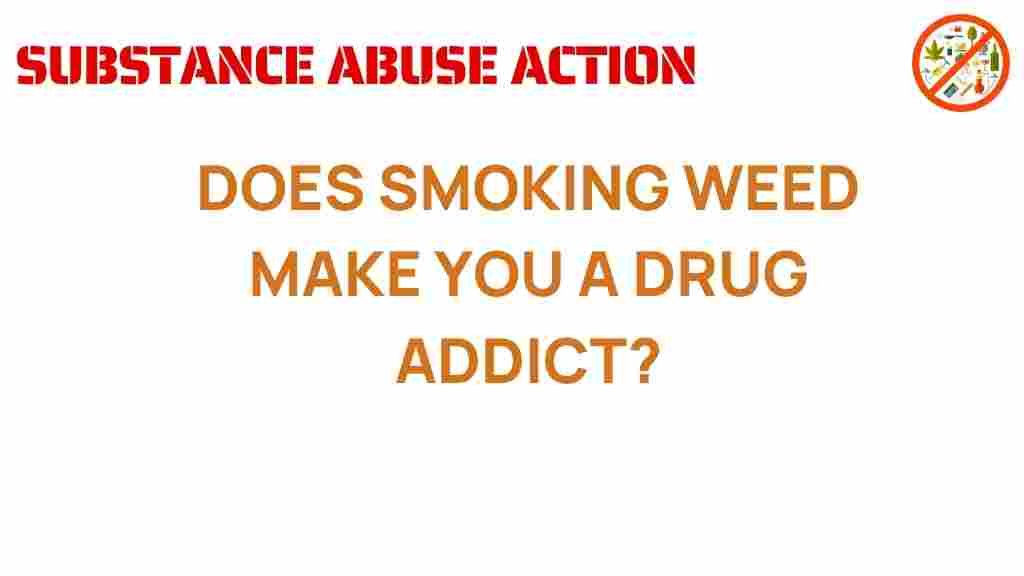Does Smoking Weed Lead to Drug Addiction? Understanding Marijuana Addiction
Marijuana, often viewed as a recreational drug, has sparked a heated debate over its potential for addiction. With increasing legalization and acceptance, many people wonder: does smoking weed lead to drug addiction? In this article, we will unpack the myths surrounding marijuana addiction and explore its impact on mental health, drug dependency, and overall well-being. By understanding the nuances of cannabis use, we can better navigate the discussions around substance abuse and recovery.
The Reality of Marijuana Addiction
While many people use cannabis without developing a dependency, research indicates that a percentage of users may experience marijuana addiction. The National Institute on Drug Abuse (NIDA) reports that approximately 9% of users develop a dependence on marijuana. This number increases among those who start using in their teens, with around 17% of adolescent users becoming dependent.
Understanding Drug Dependency
Drug dependency occurs when an individual develops a tolerance to a substance, requiring more to achieve the same effects, and experiences withdrawal symptoms when not using it. With marijuana, dependency can manifest through:
- Cravings for cannabis
- Increased usage over time
- Difficulty in controlling or reducing usage
- Continued use despite negative consequences
Myth vs. Reality: Addiction Myths About Cannabis
There are numerous addiction myths surrounding cannabis use that contribute to misunderstandings about its risks. Here are some common misconceptions:
- Myth 1: Marijuana is not addictive.
- Myth 2: All cannabis users will become addicted.
- Myth 3: Marijuana is safer than other drugs.
- Myth 4: Cannabis use has no impact on mental health.
While it is true that marijuana addiction is less prevalent than addiction to substances like alcohol or opioids, it is essential to recognize that it can still affect some users significantly.
The Link Between Cannabis Use and Mental Health
One of the most critical areas of concern regarding marijuana is its impact on mental health. Research suggests that heavy cannabis use can exacerbate or trigger mental health issues, including:
- Anxiety disorders
- Depression
- Psychosis, particularly in those with a predisposition
Moreover, individuals who start using cannabis during adolescence are at a higher risk of developing mental health disorders later in life. This highlights the importance of understanding the potential health risks associated with cannabis use.
Recognizing Substance Abuse
It is crucial to differentiate between casual use and substance abuse. Substance abuse occurs when a person’s use of a drug leads to significant impairment or distress. Signs of substance abuse include:
- Neglecting responsibilities at home, work, or school
- Using marijuana in dangerous situations, such as driving
- Experiencing legal problems related to usage
- Withdrawal from social activities and relationships
If you or someone you know exhibits these signs, it may be time to consider professional help or a recovery plan.
Steps to Address Marijuana Dependency
If you suspect that you or someone you know is struggling with marijuana addiction, here is a step-by-step process to address the issue:
- Self-Assessment: Reflect on your cannabis use. Consider keeping a journal to track how often and why you use marijuana.
- Seek Support: Talk to friends, family, or support groups. Sharing your feelings can help reduce the stigma associated with dependency.
- Consult a Professional: A therapist or counselor specializing in addiction can provide valuable insights and coping strategies.
- Set Goals: Define clear, achievable goals regarding your cannabis use. This could be reducing frequency or abstaining entirely.
- Explore Alternatives: Engage in activities that do not involve cannabis. This could include exercise, hobbies, or mindfulness practices.
Troubleshooting Tips for Recovery
Recovery from marijuana addiction is a journey that may present challenges. Here are some troubleshooting tips to keep in mind:
- Stay Informed: Educate yourself about cannabis and its effects. Knowledge empowers you to make informed choices.
- Create a Support Network: Surround yourself with people who understand your journey and can provide encouragement.
- Develop Coping Strategies: Identify triggers that lead to cannabis use and develop strategies to cope with them without reverting to substance use.
- Practice Patience: Recovery takes time. Celebrate small victories and be kind to yourself throughout the process.
Health Risks Associated with Cannabis Use
While many view cannabis as a relatively safe substance, it does carry certain health risks that should be considered:
- Respiratory Issues: Smoking marijuana can harm lung health, similar to tobacco smoke.
- Cardiovascular Effects: Cannabis use can increase heart rate and blood pressure, posing risks for individuals with pre-existing conditions.
- Cognitive Impairment: Long-term use can negatively affect memory, attention, and learning abilities.
- Increased Risk of Substance Use Disorders: Those who use marijuana are at a higher risk of developing dependency on other substances.
Understanding these health risks is essential for making informed decisions about cannabis use and recognizing when it may be time to seek help.
In conclusion, while not everyone who uses marijuana will develop an addiction, it is crucial to acknowledge that marijuana addiction is a reality for some. The myths surrounding cannabis use can cloud our understanding of its potential risks and benefits. By unpacking these myths and recognizing the signs of drug dependency, we can promote healthier attitudes toward cannabis and its place in our lives.
For those who feel that their cannabis use is becoming problematic, seeking support and exploring recovery options is a vital step. Remember, understanding the nuances of substance abuse and mental health can empower individuals to make informed choices about their cannabis use and overall wellness.
If you’re looking for more resources on addiction recovery, consider visiting this informative site that offers guidance and support for those in need. And for a deeper dive into the science of cannabis, check out this external link for valuable insights.
This article is in the category Addiction and created by SubstanceAbuseAction Team
